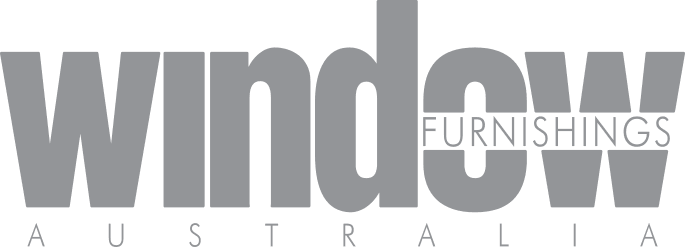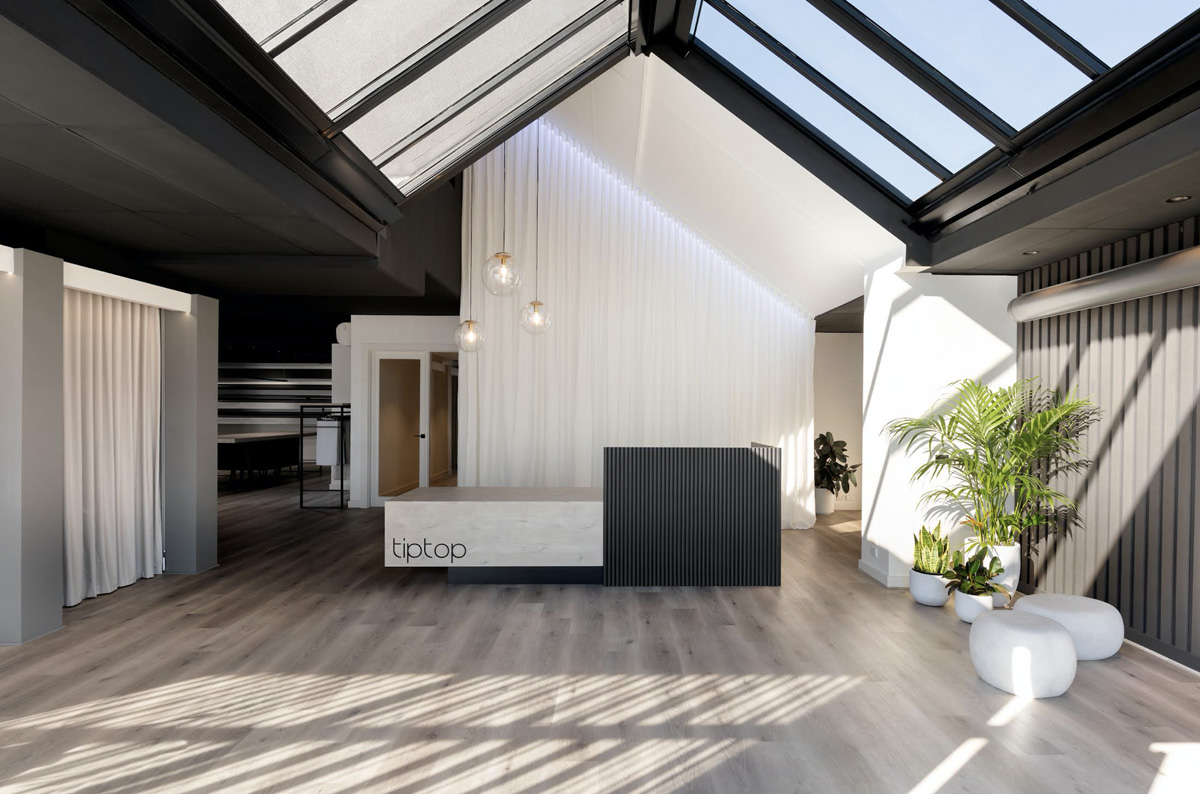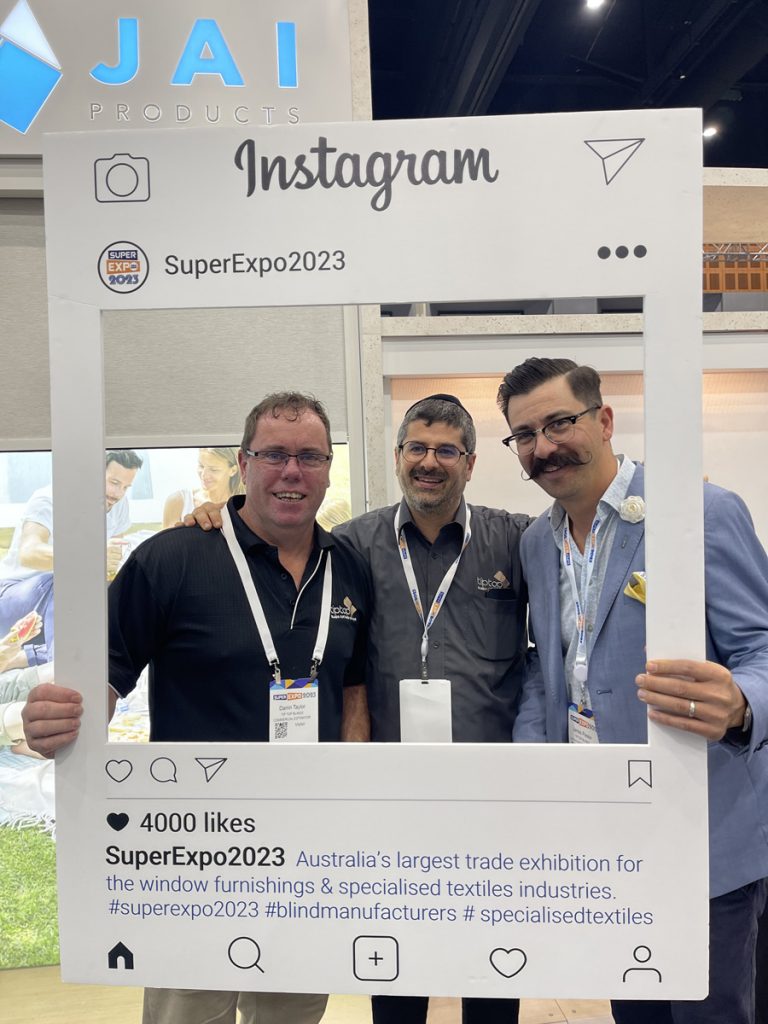

In this edition of Ask the Expert(s), Tony Cassar sits down with Jake and Miri Kinderman from Tip Top Blinds. A third generation family company, Tip Top has a reputation for quality and reliability. Tony chats to the couple about how they got involved in the industry, how their faith improves their business and how a piece of cardboard helped create one of the best known blind companies in Melbourne.
Tony Cassar: Jake and Miri, thank you for being part of the WFA Ask the Expert series of interviews.
We appreciate the opportunity.
Tony Cassar: Jake how did the name Tip Top Blinds come about?
Jake Kinderman: My grandparents came over as European immigrants in the late 1940s. They started off in the leather business, working for another business making leather jackets. At some stage they saw a niche in 50mm venetian blinds, the old aluminum venetian blinds. They went into that business and were very successful.
They bought a little shop on Glenhuntly Road called Tip Top Pianos and were unable to spend any more money. So, they took a piece of cardboard and covered the word ‘pianos’ with the name ‘blinds’ and became Tip Top Blinds. That is the history of our name.

Tony Cassar: Before Tip Top Blinds opened in 1956, how did your grandfather Max and grandmother Bella get into the leather industry?
Jake Kinderman: My grandmother, Bella Kinderman had a brother in Australia, Bernard Weinstein and he sponsored my grandparents’ visa to Australia. They started working together making leather jackets and together moved to the window furnishings industry, eventually starting two separate family businesses making venetian blinds.
Tony Cassar: 50mm venetians have come back in a way.
Jake Kinderman: I personally think 50mm venetians with the wide white tapes were a great product for rental properties because you could knock them about and they didn’t get dented. Today’s 25mm venetians in comparison are such junk. All it takes is a flick and they get a dent – they also don’t close as well. I’m glad there’s now a modern take on 50mm venetians.
Tony Cassar: Tell us about the range that Tip Top Blinds now offers.
Jake Kinderman: We sell roller blinds, sheer curtains, roman blinds, venetian blinds, skylight blinds, honeycomb blinds, plantation shutters, every type of blind that is on the market. We also sell an entire range of external blinds, awnings, zipscreens, folding arm awnings, roof systems, louvred roofs. We do it all, unlike many other companies.
We buy the fabrics and components for all our products. We cut and assemble everything ourselves, so that every product that goes out the door of our factory has been handmade, sewn, built and assembled by us. We can offer everything and therefore we’re a one stop shop instead of a customer going to multiple vendors.
Miri Kinderman: We recently completely redesigned our showroom and we now have multiple customers coming in with their plans for consultations. We go through every room in their house and work out the best window treatment for the space. Customers are after sheer curtains for their living rooms and bedrooms and we work out where they need blockout roller blinds or plantation shutters. We like to educate customers about awnings and outdoor blinds. We believe combining internal and external blinds for west facing windows for example is the right way to go.
We also find that people are spending way more money on their landscaping than ever before and they need a shade product so that they can enjoy their outdoor space in summer. They come into the showroom with their plans and work out whether they need a Folding Arm Awning, retractable roof to go over their pergola or a Zipscreen blind to enclose their alfresco.
Tony Cassar: How important is it to control your own destiny by manufacturing your own products?
Jake Kinderman: The most important thing is price. Whether it’s wholesale, commercial or retail customers, we are able to offer them a better price because they are buying directly from the manufacturer. We also find it important to have control over the manufacturing. If an existing customer comes back to us saying they need one more product, instead of making them wait six weeks, we’ll squeeze it in for them. That’s what we do, we push it through the production line. And then there’s the quality. We know every component going into each product and we know what we’re doing. This goes right through to installation by our own team. We are fully in control and satisfied with the quality from the inception of the idea, until it is up on the customer’s windows.
Tony Cassar: What percentage of your work is wholesale versus retail?
Jake Kinderman: We’re probably now broken up into three parts: retail, wholesale, and commercial. Retail will still be probably 40-50% of our business. Commercial would be 25-30 and wholesale 25-30 percent.
Tony Cassar: How many team members do you have in the business?
Jake Kinderman: 35. Some of our staff have been with the company for 25 or 30 years. They are not just staff, they are family. We really look at ourselves as family. We look after our staff and our staff look after us. We’re a trusted close-knit team.
Tony Cassar: When did you commence in the business?
Jake Kinderman: 18 years ago, I arrived into the business after finishing my studies. I studied overseas. I came back to Australia and I didn’t even think of doing anything else because blinds are in our blood.
I arrived back in Melbourne with two young children and I joined the business. My brother-in-law was production manager at the time and he told me that I was taking over his job as production manager. I was like, “OK, I guess I’m production manager.” He spent two weekends teaching me everything he thought I had to know in order to get started. He then had the guts to sit back and watch me struggle through it, make mistakes without saying a word. It took a couple of months for me to earn the respect of the staff because I was a rookie. I was the greenest one in the whole business.
Tony Cassar: What other roles have you occupied in the business?
Jake Kinderman: I went from production manager into sales, acquiring new wholesale customers. By then I had experience on the factory floor, I knew the product intimately, so I was able to sell our product to other retailers, and then I moved on to a general manager position.
Tony Cassar: You’ve got a beautiful showroom. How advantageous has this been to business?
Miri Kinderman: Only 15 years ago when people were building or renovating a home they would get inspiration from a couple of magazines. There were one or two apps available, but people mainly got ideas from magazines, photos, and seeing what friends have done. But today before people start talking to an architect or designer, they are online, they’re checking out websites, Pinterest, they’re following on Instagram and other social media platforms, and they have a mood board of everything they’re going to be using in their homes. They’re getting inspiration and know what they want. They see so much and want to know the company they are engaging can deliver the exact product they are after.
A few years ago, before sheer curtains for example came into fashion, customers were spending an average of about $5000 on window treatments for a new home. They were getting some roller blinds, double roller blinds, one or two Romans or blockout drapes if they had a designer helping them. Today however, it’s not uncommon to see a million-dollar home getting $20,000 in window furnishings. Before spending that much money, customers want to come in to see, touch and feel the product. They want to understand the choice they are making. That’s the biggest advantage.
Jake Kinderman: We have an entire section in our showroom that is a fabric library. It has large three metre pieces of fabric. We have over 150 pieces of fabric there. Customers can pull it out, touch, feel, and see exactly what it’s going to look like. It’s all there in front of them. People are also still scared of motorisation. They want to come and see it work, press the button and see what happens as a result.
Miri Kinderman: In the showroom, even something as simple as a roller blind can really come to life. There are so many stunning fabrics available that make a simple roller blind look like a piece of furniture. Customers see our display of roller blinds that have a fabric-wrapped bottom rail and can’t believe a roller blind can look this good!
Jake Kinderman: The showroom also inspires confidence. Once customers see something in the showroom, they believe we can do it for their home. You won’t believe how many times we had people come in, point to the huge sheer curtain and blockout roller blind we have hanging on our front windows and say ‘I’ll have exactly that, in the same colours and finishes’. They see it, love it and want it.
Miri Kinderman: We always take them into the factory as well. There is a secret door from the showroom to the factory and we ask customers if they want to see where it all gets made. We open the door and people are often surprised. There are not that many companies manufacturing in Melbourne these days. We are all familiar with manufacturing and we all know how a blind gets made, but for customers it’s like an eye opener and they just want to see it.
Tony Cassar: What advice would you give other window covering companies that have discussed expanding their showroom?
Jake Kinderman: Do it! People want to see what they are getting.
Tony Cassar: Jake, what are the greatest challenges in the business at this particular time?
Jake Kinderman: I would say the volatile dollar makes it very hard. We are buying fabrics and components from Australian companies, but their products come from overseas so we are bound to the volatility of the dollar and prices are going up, not going down. The cost of living is another concern, interest rates are higher which means customers have less money to spend.
Miri Kinderman: At the end of the day, it’s the building industry that is going to suffer because of interest rates. So maybe not quite yet because people right now are furnishing the homes that they started building two years ago, but eventually it’s going to catch up with them.
Jake Kinderman: Finding skilled staff today is a challenge. It’s a big problem because we are only able to hire people that have the necessary skills and experience to do the job. Finding people that are willing, eager, hungry and good is a huge ask.
Tony Cassar: What are your thoughts on the new proposed industrial relations laws?
Jake Kinderman: If you ask me, the government wouldn’t have a clue. They’ve never had a business, never run a business. They are sticking their nose into an industry that they do not understand. They are trying to kill manufacturing in Australia and make it impossible.
They have been doing this for generations – my grandfather, my father, they’ve all had to go through this. We are dealing with the day to day challengers of staff, customers, suppliers. It is becoming harder and harder, a real challenge.
Tony Cassar: What other promotional activity do you do for the business?
Miri Kinderman: We have a new website which we launched a year ago and our social media team is working hard. We’re constantly communicating with our followers on Instagram, Facebook, Tiktok and Pinterest. We have a digital marketing company that’s doing great things for the business.
Jake Kinderman: But we still believe in word of mouth. That is still a powerful tool. If someone walks into your house and sees beautiful sheer curtains or a new folding arm awning on your deck and you tell them ” I have an amazing experience with Tip Top,” that will sell you a job every day of the week because again it’s all about being real. We’re about integrity, we’re about hard work, we’re about service.
Miri Kinderman: Today’s word of mouth is on the stories on Instagram. When we share the behind the scenes of our business, people relate to it and they want to see more. We get the best reaction when we share photos of customers visiting the showroom. People are sick of photos of pretty interiors. When they see people visiting our showroom they want to come and experience it for themselves.
Tony Cassar: What challenges do you believe the window covering industry is facing in the present and future?
Jake Kinderman: Industrial relations and restrictions that the building industry is placing on us, mainly the external combustibility. That issue with external blinds has not been rectified yet and it’s making things impossible for external blinds in commercial buildings in Victoria and other places in Australia. It is so complicated to get a fire report.
They just need to work with the industry and sit down to talk to us so that we can come up with a solution that works. Safety should be the priority, but people from the industry should be at these meetings to come to conclusions and work it all out.
The influx of motorisation is going to be a big thing in the future. In the United States and Canada chains are likely to be completely banned in the very near future due to accidents and fatalities and Australia will likely follow suit. Motorisation is easy, especially if you are building a new house or doing a serious renovation and take it into consideration when you’re planning. It’s also quite affordable. Retrofitting motors is something that’s going to get bigger and bigger in the future. In my opinion, we’re going to see a lot more motorised blinds.
Tony Cassar: The window covering industry has seen many changes over the years. Where do you see the industry heading?
Jake Kinderman: I think that as Miri mentioned, external blinds and shade solutions have become a very big part of the industry because it’s not just covering windows anymore. It’s more like creating external living and especially in Victoria where we can have four seasons in one day, there’s sun protection, wind protection, rain protection. And I believe there are a lot of innovative products out there that customers are eager to get their hands on.
Tony Cassar: What does the future look like for Tip Top Blinds?
Jake Kinderman: We’re really looking at servicing the upper market with sophisticated products because we have the confidence. We have all the necessary equipment built in our factory. We are collaborating with architects from the inception of the project and making sure they get a perfect result for their clients.
We are definitely going to continue on with what we’re doing with the general population and continue growing the commercial part of our business that is currently being done by Darrin Taylor, another guy who has been in the industry for a very long time!’
Tony Cassar: Jake what have been your greatest achievements throughout your career and personally?
Jake Kinderman: My family is my greatest achievement. There’s no doubt about it. Five boys and one little princess is another full time job. I’m constantly changing the blinds in her room because she goes from loving Peppa Pig to Unicorns. She currently has a gorgeous pink Roman blind and a sheer roller blind with Unicorns printed over the fabric. But I’m sure we’ll be updating that soon.
And personally watching the business morph from being a little humble venture to becoming an industry force is an unbelievable feeling of success.
Tony Cassar: Which people have been the greatest influences in your life?
Jake Kinderman: My father and grandfather taught us all about good old fashioned hard work, integrity, honesty, customer service and going above and beyond. We’re always there to help until the customer is happy. My dad was dedicated. His life was the business. My grandfather’s life was the business. He worked until almost his very last day. That’s definitely my inspiration for sure.
Tony Cassar: Tell us what your interests are outside of business?
Jake Kinderman: Do I have time? Not much time. It’s blinds all the time. My kids are always telling me, “You’re always at work, you’re always at work.” There’s not much time for a personal life, that’s for sure. But on Saturdays when I’m not at work it’s family time. We don’t do anything exciting, we don’t climb Mount Everest, we don’t do big trips. We just spend quality time together.
Tony Cassar: Jake and Miri, thank you for your time today.
Jake Kinderman: Thank you for the opportunity.
Miri Kinderman: Thank you Tony.